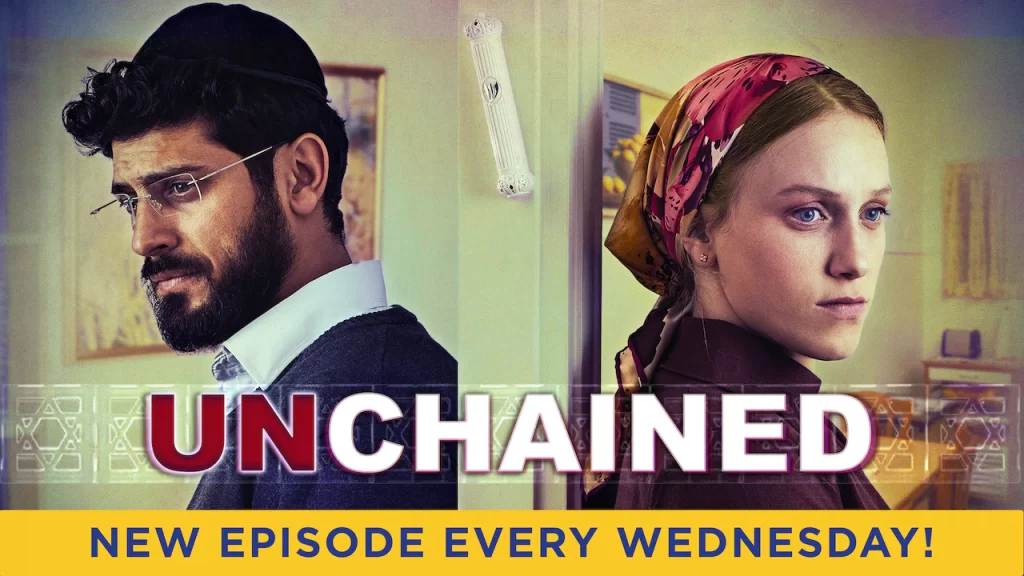Unchained

by Phyllis Chesler
I simply could not stop watching Unchained, “Matir Agunot” in Hebrew, a 12-episode TV series which I watched as if it were a feature film. I found it on the streaming platform ChaiFlicks, which has been dubbed the Jewish Netflix.
Unchained is beyond fabulous. It pulled me right in and kept me rooted to my screen. It is Shtisel on steroids. (And yes, ChaiFlicks also streams both Shtisel and Fauda). When you think you know what’s going on—the ground beneath your feet shifts, and something truly unexpected happens. And keeps happening.
It is a story about religious Jews in Bnei Brak. We have a soulful and good-looking Sephardic rabbi (Aviv Alush) who also functions as a detective as he pursues hard-hearted husbands who refuse to give their wives a Jewish divorce. Rabbi Yosef Morad travels to Ukraine and Estonia to do so. Hana (Avigail Kovari) is his troubled wife, the young, blonde daughter of a Chief Rabbi (Nathan Dattner) who has a shocking past and who currently leads a double life. (And it’s not what you might think). The film also deals with the problem of infertility, the stringent Jewish rules of family purity, criminal gangs in Israel, animosities between Ashkenazi and Sephardi/Mizrachi Jews, the Jewish love of family, the power of revered rabbis, the demands of faith, homosexuality, the limitations and advantages of a secular life, and much more.
The film is about human nature and it is a work of art.
I was privileged to learn about agunot, “chained” women from the late Talmud ..scholar, Rivka Haut, (z’”l). I knew very little about these martyrs to the faith—women who would not leave Orthodox Judaism not even when their revered rabbis failed them. This meant that they could never date or marry again. I learned about husbands who extorted huge sums from such women in exchange for their freedom—or demanded sole custody of children with no visitation with their mother. Some such men were wife-batterers, drug addicts, gamblers, and adulterers.
Haut and others with whom she worked both lobbied hard for agunot with recalcitrant battei dinim and accompanied very frightened women on their appointments to receive a get.
Haut, Susan Aranoff, and Susan Alter also organized demonstrations outside the homes and even synagogues of men who refused to unchain their wives; men, who themselves sometimes got rabbinical permission to remarry, or who had girlfriends, or who married non-Jewish women. One of these demonstrations took place in my old hometown of Boro Park, right around the corner from where I grew up, another at a familiar synagogue. Eventually, Haut and Aranoff published a book about agunot titled The Wed-Locked Agunot: Orthodox Jewish Women Chained to Dead Marriages.
If only they had a rabbi like Yosef Morad on their side.
I am praising just one film—but ChaiFlicks livestreams many more Israeli and Jewish-themed films. All are sub-titled.
Three smart people founded it: Neil Friedman, Heidi Bogin Oshin, and Bill Weiner. Heidi tells me that they launched “the Beta phase of ChaiFlicks the first week of the COVID pandemic shut down but officially we started the platform in August 2020. Viewers could access content via smartphones, computers, tablets, and smart TVs.”
Currently, ChaiFlicks has over “1500 pieces of content ranging from narrative films, documentaries, shorts, theatrical pieces, dance performances, music videos and TV series.” The platform is available in the United States, Canada, Australia, and New Zealand—and they plan to open up in the UK within “the next few months.”
According to Heidi, they “launch at least three new programs every week and a new TV series every month.”
Neil Friedman founded Menemsha Films, a Jewish-themed distribution company, and sold The Women’s Balcony to Netflix. However, when Netflix passed on another film, 1945, a rare production about the Holocaust in Hungary, Neil realized that he’d have to “launch our own channel.”
Why not join this live streaming platform which costs only $5.99 a month or $60.00 a year? I certainly plan to do so.